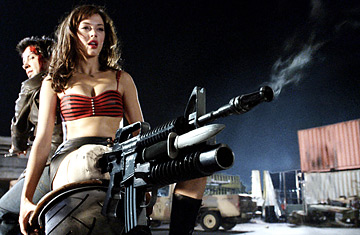
Rose McGowan in the Planet Terror segment of Grindhouse.
Writer-director: Robert Rodriguez
With Rose McGowan, Freddy Rodriguez, Marley Shelton, Josh Brolin, Naveen Andrews, Bruce Willis
Dimension Films / The Weinstein Company
Available Oct. 16
On its release in April, Grindhouse, the double feature of films by Quentin Tarantino (Death Proof) and Robert Rodriguez (Planet Terror), was intended to replicate the 70s moviegoing experience in cruddy theaters showing unpedigreed action films. You'd get a twin bill and some previews of coming attractions, all of aged prints with splices, missing reels and lousy projection. The project tanked at the box office (a $25 million domestic gross on a reported $67 million budget), partly because its target audience of young males wasn't drawn to the kind of movie their dads barely admitted to seeing when they were kids. Grindhouse was nostalgic for an era unknown and unalluring to today's teens, who grew up seeing movies in arena seats in bland, clean multiplexes.
The notion always made more sense for home-viewing, especially with the context these respected filmmakers would surely provide. Bizarrely, Tarantino, the great enthusiast and explicator of 70s and 80s weapons-grade action cinema, didn't do a commentary track for the Death Proof DVD. Blessedly, Rodriguez atones for his buddy's sin of omission on this two-disc, "extended and unrated" version of Planet Terror.
I've already reviewed Grindhouse, with varying degrees of indulgence and discomfort. For those too lazy to click on a link, Planet Terror is a tribute to zombie movies like George Romero's 1968 Night of the Living Dead, with subplots from cop movies, TV doctor shows and redneck revenge dramas thrown in for... well, why the hell not? At the center of the exploding pustulence are Cherry (McGowan), an exotic dancer who loses a leg to the zombie infection and is later fitted with a machine-gun prosthesis, and his moody ex-beau El Wray (Freddy Rodriguez). The cast slips into many of the beloved stereotypes familiar from grindhouse fodder, but it's filmed with a gritty grandeur and technical brio that makes it worth watching even for non aficionados of sleaze.
Rodriguez, the do-it-all kid from Austin, Texas, (he's listed in the Planet Terror credits as writer, director, producer, cinematographer, co-editor, composer, visual effects supervisor, co-rerecording mixer, digital effects and previsualization executive producer, music producer, songwriter and "Mr. Rodriguez's chef"), also found roles in the film for his son, his two nieces, his second cousin (movie tough guy Danny Trejo), his best friend, his realtor and his physician, who's in a hospital scene displaying disgusting slides of genital lesions. (Star Freddy Rodriguez is no relation). This may suggest a weird blend of narcissism and nepotism, but who cares? Some of his movies are really good — El Mariachi, the first Spy Kids and the deathless Sin City — and even the lesser ones show how Hollywood bloat can be slim-fasted without forsaking expertise or the sense of fun at the heart of B movies.
The director is an agreeable movie companion on the commentary track. He points out split-second gags (Shelton's note pad reads "To do: cereal for Tony, crickets for Tony's pets, kill Bill" — Bill being her husband, Brolin, and the title of Tarantino's previous epic). He itemizes his homages to the early films of John Carpenter, to Lucio Fulci's Zombie and the spaghetti Western Django. He shrugs off the movie's inconsistencies ("how the hell Rose is shootin' a machine-gun leg with no trigger") and dismisses one shot as "some real film school bulls--t. If this was my first movie directing for Roger Corman, I'd probably would have been doing this kind of trick."
At 39 a veteran of 11 feature films that look great and are made for a fraction of what others directors would spend, Rodriguez is just the fellow to elucidate the B-movie ethos. Rule 1: "Why waste two weeks shooting something you can shoot in two days if it's only gonna last 30 seconds?" Rule 2 (as another building blows up): "Destroy as you leave." He speaks proudly of Planet Terror's grottiest scene, where a zombified Tarantino walks toward McGowan with his infected penis dripping into goo. "This is one of those moments," he observes, "where you're supposed to not know if you're really watching this or if you're hallucinating. That's what these grindhouse movies are like."
Another welcome extra is Rodriguez' "10-minute film school" (actually about 12 mins.), in which he reveals the secrets behind McGowan's machine gun leg, the aging-the-film effect (making a new digital movie look like a deteriorated film print), his technique of adding a splice to any chopping motion, the use of fake blood on the camera lens and of course the gut-vomiting puppet. I'm not sure these niceties are taught in official film schools, but they ought to be, especially with Rodriguez as a combination of professor and class clown.